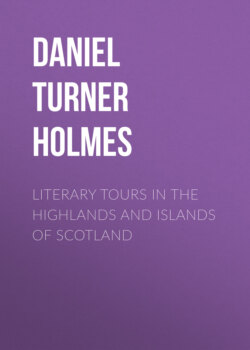Читать книгу Literary Tours in The Highlands and Islands of Scotland - Daniel Turner Holmes - Страница 9
На сайте Литреса книга снята с продажи.
GAELIC BOOKS.
ОглавлениеTable of Contents
In selecting the books specially intended for the perusal of the older people, an attempt is made to meet the needs of the various localities. In the bi-lingual districts there is always a shelf of Gaelic books, such as the original texts of Norman Macleod's exquisite sermons, M'Rury's religious compilations, Macleod's clever poetry The Lyre of the Grove, Campbell's Popular Tales of the West Highlands, and Magnus Maclean's manuals of Celtic Literature. There being a distinct dearth of comely Celtic reading that the ordinary native can understand, arrangements have been made for the translation into Gaelic in several volumes by competent scholars, of extracts from Mr. Lang's True Story Book, and from other sources.
The regrettable thing about Gaelic is its hopelessly bewildering spelling. The sounds are pleasing and melodious in a high degree, but they hide themselves behind most peculiar disguisements of print. Most people will admit, I think, that a language which spells Avon, Amhuinn, and Rory, Ruaridh, would benefit greatly by a visit from Pitman. The utility of sane phonetics was brought home to me very forcibly by a story I heard from a gentleman in the west of Skye. This gentleman is an excellent English scholar, can speak Gaelic but is unable to read it. He got a letter once from St. Kilda composed by an islander who spelt Gaelic by ear and not according to the awe-inspiring orthography of the dictionary. The gentleman, who could not have made out the letter had it been spelt correctly, was able to read it as it stood, without the slightest hesitation. If a more rational spelling were generally adopted, an immense number of Lowlanders who are interested in philology, would study the grand old tongue, were it only to understand the numberless place names of Celtic origin that occur in British geography.
What I have said about Gaelic spelling explains the inability of a large percentage of the population to read a book printed in the native idiom. What is the use then, it may be asked, of translating the True Story Book? The answer is obvious to one who knows the Highlands. In the Outer Isles there are many old people who know no English and whose only literary solace comes from listening to others reading. At the evening ceilidh a competent reader of Gaelic can usually be found. Then, again, we are likely to see, in the near future, a notable revival of interest in the old language, consequent on the efforts of the Mod, and on the recognition of Gaelic by the Department as a fit subject of study in the Highland schools. Such a revival, to be lasting in its effects, must be enforced and sustained by a constant supply of pure and interesting Gaelic books, both native and translated. Religious books there are in abundance, thanks to the zeal of the Protestant clergy. Needless to say, the compilations of the Dean of Lismore are as unintelligible to the modern Gael as Cynewulf is to a London cab-driver. I should like to see a round dozen of good English novels put into Gaelic by translators who knew the idiom thoroughly.
The fervour displayed at Highland gatherings, admirable as it is from a sentimental point of view, is apt to grow cold at the prospect of laborious work to be done. It is not creditable that the great majority of Gaelic speakers are unable to read a page of Gaelic print. Nor is it creditable that those who can both read and speak, do so little for the interpretation of the literature. Blackie's books and translations are still among the best, and Blackie was a Lowlander, was born, indeed, in the Saltmarket of Glasgow. My frequent visits to the north and west have convinced me that another difficulty in the way of a possible resurgence of Gaelic is the lack of a recognised standard of colloquial speech. The language is split up into many dialects, each possessing its own special idioms and vocabulary. A Glasgow firm of printers not long ago conceived the idea of printing post-cards with Gaelic greetings: they found that every city Highlander they consulted had either in grammar or turn of phrase some special way of framing the sentences. "Grand Gaelic to-day!" is an exclamation sometimes heard at the door of a Highland church in town, and indicates that the minister who has officiated comes from the same strath as the person speaking.
A moderate amount of encouragement to Gaelic is all that can reasonably be expected from the Government, seeing that the prime duty of the schoolmaster everywhere is to impart a sound knowledge of English.[2]
